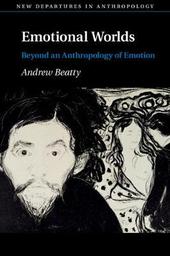
|
Emotional Worlds: Beyond an Anthropology of Emotion
Paperback / softback
Main Details
| Title |
Emotional Worlds: Beyond an Anthropology of Emotion
|
| Authors and Contributors |
By (author) Andrew Beatty
|
| Series | New Departures in Anthropology |
|---|
| Physical Properties |
| Format:Paperback / softback | | Pages:314 | | Dimensions(mm): Height 228,Width 151 |
|
| ISBN/Barcode |
9781107605374
|
| Classifications | Dewey:152.4 |
|---|
| Audience | | Professional & Vocational | | Tertiary Education (US: College) | |
|---|
| Illustrations |
Worked examples or Exercises
|
|
Publishing Details |
| Publisher |
Cambridge University Press
|
| Imprint |
Cambridge University Press
|
| Publication Date |
7 February 2019 |
| Publication Country |
United Kingdom
|
Description
Are emotions human universals? Is the concept of emotion an invention of Western tradition? If people in other cultures live radically different emotional lives how can we ever understand them? Using vivid, often dramatic, examples from around the world, and in dialogue with current work in psychology and philosophy, Andrew Beatty develops an anthropological perspective on the affective life, showing how emotions colour experience and transform situations; how, in turn, they are shaped by culture and history. In stark contrast with accounts that depend on lab simulations, interviews, and documentary reconstruction, he takes the reader into unfamiliar cultural worlds through a 'narrative' approach to emotions in naturalistic settings, showing how emotions tell a story and belong to larger stories. Combining richly detailed reporting with a careful critique of alternative approaches, he argues for an intimate grasp of local realities that restores the heartbeat to ethnography.
Author Biography
Andrew Beatty teaches anthropology at Brunel University. He has carried out five years' fieldwork in Indonesia and is the author of four other books, including After the Ancestors: An Anthropologist's Story (Cambridge, 2015).
Reviews'Andrew Beatty has produced a subtle, literate and humane account of how emotions are expressed, narrated and construed in very different societies. The study of emotions in context, set in narrative frameworks, demands a very special ethnographic engagement and empathy, but as Beatty argues, 'the field reveals what the lab and the library cannot'. Presenting ethnographic case studies, some based on his own extensive fieldwork in Indonesia, drawing on wide reading in anthropology and psychology, Beatty's moving, insightful book transcends disciplinary boundaries.' Adam Kuper, Boston University
|